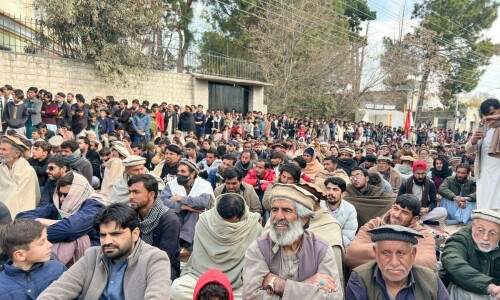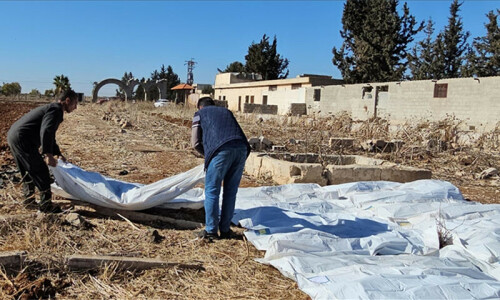
WASHINGTON DC: Military operations by the Pakistan Army, US drone strikes and violence due to militancy have caused innumerable civilian casualties in northwest Pakistan. Large numbers have been killed, injured and displaced. Although the Pakistan government has provided compensation, it is wanting in many respects.
This was the topic of discussion at a meeting hosted by the Asia Program of the Woodrow Wilson International Center for Scholars in Washington, DC, which I had the good fortune of attending. The event marked the launch of a report by the Campaign for Innocent Victims in Conflict (CIVIC), titled “Civilian Harm and Conflict in Northwest Pakistan.” The report is based on the findings of CIVIC field fellow Christopher Rogers who spent a year in Pakistan, interviewing war victims. The speakers at the event were Rogers himself, and Huma Yusuf, Wilson Center’s Pakistan Scholar. The event was organised by Michael Kugelman, the Asia Program Associate for South Asia.
The talks by both speakers provided insights into civilian casualties and the government (both, US and Pakistan) response to it and the complexities which arise from the situation. Rogers pointed out that there had been more civilian casualties in Pakistan than in Afghanistan during 2009. According to Roger’s report, there were 2,400 civilian deaths in Afghanistan in all kinds of conflicts. In Pakistan, however, there were 2,100 deaths caused by terror attacks alone. As Rogers stated, more civilian harm has been caused by US drone strikes than the US government admits.
In Rogers’ findings, what the interviewees wanted most was compensation for harm done to them. Although the government administers a compensation scheme, it is ad-hoc and not all-encompassing, leaving most civilians who are harmed with no access to compensation schemes. According to the report, there is no standard operating procedure in place to “investigate allegations of civilian harm, apologising for mistakes or collateral damage or providing immediate assistance to families suffering losses.”
Rogers said that both countries, Pakistan and the United States, need to provide more information about civilian harm. Victims wanted answers as to why they were being attacked. He said that there was good reason for the Pakistan government to win the hearts and minds of the civilian population being harmed in the northwest of the country. He pointed out the need for the international community, including the US, to provide support in implementing compensation schemes in such instances.
Huma Yusuf provided a broader context to Rogers’ discussion. According to Yusuf, there was little political will on the part of the government to deal with the issue of civilian casualties in the northwest. This, she said, is because the government believes that it too, is under attack. Civilian harm does not politically serve the government, as fighting terror was the platform on which it was elected.
Yusuf pointed out that compensation packages provided by the US government could be problematic for a number of reasons. Firstly, because ground operations are not officially sanctioned, compensation provided by the US government could result in complications. Secondly, American citizens would probably not be willing to provide compensation as they would deem this as compensating people who could possibly be providing support to militants. Thirdly, American compensation would be seen, by Pakistanis, as an admission of guilt on the part of the US government.
However, Yusuf’s claims regarding US-sponsored compensation were challenged by Rogers. He said that similar programmes had been used in Afghanistan and Iraq, and there was no reason why American citizens would not be willing to contribute to compensating Pakistani civilians for harm caused by drone strikes.
While responding to a question during the question and answer session, both Rogers and Yusuf agreed that the civil society could play a positive role in addressing civilian harm. Yusuf brought attention to the fact that, although this was a good idea, there was a problem of the media not having easy access to the conflict zones. In this context, she pointed out the need for some subtle media investigation. The media’s role in differentiating between civilians, militants, the military etc., is wanting.
The hosting of the event was laudable as it brought attention to an issue that often gets hidden due to the high number of militant casualties caused by drone attacks and military operations. The issue of civilian casualties is just as important, if not more. This is because the civilians who are harmed often don’t have sufficient political, economic or social power to protest against this, or for that matter, any injustice caused to them. It is high time that individuals who do have the ability to speak out and be heard, do so on their behalf. The people in northwest Pakistan have as much right as anyone else to be protected from the effects of war.














































Dear visitor, the comments section is undergoing an overhaul and will return soon.